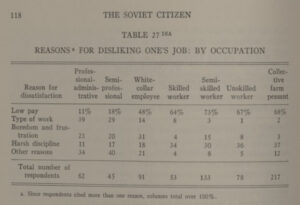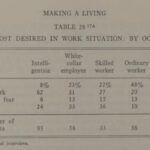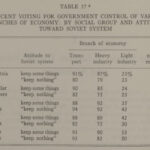Published Cambridge, Mass., 1959
From 1950 to 1951, an allied team of Harvard social scientists and psychologists interviewed more than 3,000 Soviet refugees in Europe and the United States. The directors of the study, Alex Inkeles and Raymond A. Bauer, hoped to use the information to create a “working model” of the Soviet Union to better understand other advanced industrial societies. It was called the Harvard Project on the Soviet Social System, and The Soviet Citizen was the major fruit of its research.
The Soviet Citizen is an attempt to capture what the authors call the “social-psychology of Soviet life.” Rather than focusing on factory management, health care, or politics, as early HPSSS publications had, this volume concerns people and their daily lives. Initially intended to be a quantitative analysis gleaned from refugees’ interviews, the book’s premise expanded as the Soviet Union went through precipitous changes in the 1950s, namely the death of Stalin and the USSR’s subsequent “de-Stalinization.” The borders opened up during the “Khrushchev thaw,” and the authors visited Russia, an opportunity unheard-of in the Stalin era, which allowed them to counterbalance the interview data with first-hand impressions of the country.
 And the results are riveting. Who would have guessed that, while the intelligentsia is more inclined to think that the Bolsheviks are worse than the Nazis, the average farmer is more likely to think that the Bolshevik leaders should be put to death? Priceless, too, is the data that provides intimate glimpses into family and social life: Which social class prefers concerts to movies? Which is more inclined to question the reliability of state-run news sources? Which thinks that America is the least intelligent country in the industrialized world? The answers might surprise you!
And the results are riveting. Who would have guessed that, while the intelligentsia is more inclined to think that the Bolsheviks are worse than the Nazis, the average farmer is more likely to think that the Bolshevik leaders should be put to death? Priceless, too, is the data that provides intimate glimpses into family and social life: Which social class prefers concerts to movies? Which is more inclined to question the reliability of state-run news sources? Which thinks that America is the least intelligent country in the industrialized world? The answers might surprise you!
In recent years, Inkeles and Bauer’s work has been re-evaluated and, in a few cases, challenged, though it remains a continually-cited cornerstone of Soviet scholarship. Indeed, a recent scholarly article refers to it as “the most authoritative assessment of the attitudes of the Soviet citizens toward the communist regime.”
Full transcripts of the refugee interviews are now available online through the HPSSS website.



